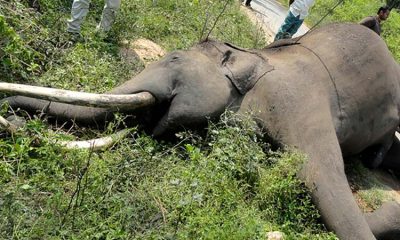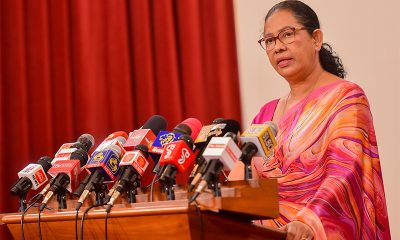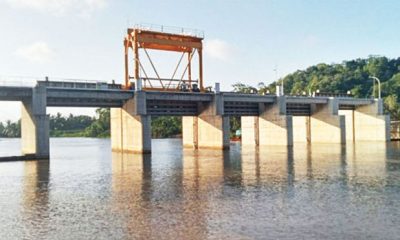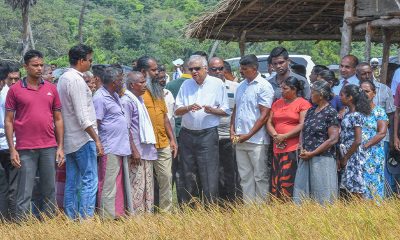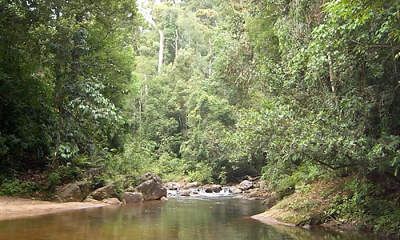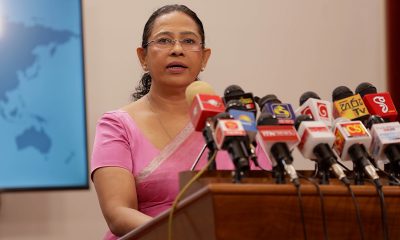Editorial
Pavithra’s jumbo task

Friday 21st July, 2023
Minister of Wildlife and Forest Resources Conservation Pavithra Wanniarachchi finds herself in an unenviable position. The two sectors under her purview are perennially in crisis, and sorting them out is a Sisyphean task, which no minister has been equal to all these decades. Among the intractable problems she is facing are the fast receding forest cover and the ever-worsening human-elephant conflict (HEC); the two issues are interconnected.
Minister Wanniarchchi has undertaken to formulate a policy and work out a strategy to resolve HEC, according to media reports. She is right in having done so, and deserves encouragement and support, given the gravity of the situation. Researchers have pointed out that since 2019, HEC has left 125 people and 370 elephants dead in Sri Lanka, which has recorded the highest annual elephant deaths and second-highest human deaths due to HEC. The human death rate has increased by approximately 42% over the previous three decades, we are told. Year 2022 was particularly bad for humans and elephants in this country with 145 people and 133 elephants being killed.
The number of elephant deaths in Sri Lanka averages one a day, according to the conservation web portal, Mongabay, and the leading cause thereof is human intervention. Scores of elephants suffer violent deaths at the hands of humans, who resort to cruel methods such as shooting, electrocution and hiding improvised explosive devices in food bait, in dealing with marauding wild elephants.
There are a significant number of Sri Lankan experts who have done extensive research on HEC, and they are willing to help save humans and elephants. It is hoped that Minister Wanniarachchi will enlist their support and ensure their active participation in the formulation of policies.
The intensification of HEC and the resultant high death tolls have come as no surprise. A study conducted by a group of experts in 2019 has found that humans inhabit about 70% of the elephant range in Sri Lanka, and nearly 40 percent of land outside the protected areas is shared by humans and elephants. Rapid deforestation has caused elephant habitats to shrink rapidly, driving wild jumbos to invade villages, destroy cultivations, houses and human lives and run the risk of being killed in the process.
It defies comprehension why in this day and age, when technology has enabled things that were considered impossible a few years ago, we cannot save elephants from moving trains, which kill quite a few of them every year. We should be able to find a technological solution to the problem of train-elephant collisions.
There have been some half-hearted attempts to resolve HEC during the past so many years but they did not reach fruition as there was no consensus among the stakeholders on a strategy to be adopted. Most experts have been working in silos, but their research has yielded valuable data, which can be utilised to mitigate, if not end, HEC. If Minister Wanniarachchi cares to bring them together and ensure that they make a concerted effort to break the back of HEC, it will be possible to save the precious lives of humans and elephants.
The success of any strategy to resolve HEC will hinge on the conservation of forests and the reforestation of denuded areas to ensure that the elephant habitats will be preserved. This is one of the reasons why we opposed President Gotabaya Rajapaksa’s decision to transfer the authority over ‘peripheral’ forests from the Forest Department to the District Secretaries purportedly to promote rural agriculture. The ulterior motive behind that move was to allow government supporters to grab land, which has to be kept free from human activity to ensure the wellbeing of forests. Unfortunately, what we feared is happening.
Most of all, it is hoped that Minister Wanniarachchi has overcome her unhealthy fascination with the occult, which she amply demonstrated by helping promote a shaman’s herbal concoction as a cure for Covid-19, and dropping pots containing ‘miracle water’, into a river to rid the country of pandemic while she was the Minister of Health. Otherwise, it may be difficult to adopt a scientific approach to resolving HEC.
Editorial
From ‘Granary of the East’ to a mere hunduwa

Thursday 5th March, 2026
There was a time when Sri Lanka was known the world over as the Granary of the East. Ancient rulers made selfless sacrifices to enable it to achieve and sustain self-sufficiency in food, especially rice. Alas, it has today become a hunduwa (a small traditional rice-measuring cup), according to its current Head of State himself.
On Tuesday, President Anura Kumara Dissanayake (AKD) caused quite a stir by referring to Sri Lanka as a hunduwa in a bid to drive a point home in Parliament. Opposition politicians let out howls of protests, condemning him for disparaging the country. Their ruling party counterparts, true to form, did their best to obfuscate the issue and defend their leader.
If the Granary of the East has ended up as a mere hunduwa, as President AKD says, then the blame for its retrogression should be apportioned to its leaders, both past and present. All of them secured power by promising to usher in good governance and develop the country, but they conveniently reneged on their promises.
The JVP-led NPP came to power on an anti-corruption platform, claiming that the leaders of all previous governments had institutionalised waste and corruption among other things, and the post-Independence era had been a 76-year curse, which had to be broken. Its campaign slogan struck a responsive chord with the resentful public and helped it obtain a two-thirds majority in Parliament to eliminate the scourge of corruption. One cannot but agree with President AKD that previous governments were notorious for corruption, and the corrupt elements currently in the Opposition, masquerading as good governance campaigners must be brought to justice. Similarly, the incumbent government must make a serious effort to rid itself of corruption, which is eating into its vitals.
US President Donald Trump’s Operation Epic Fury (or Epstein Fury?) against Iran, its economic fallout, and the brouhaha over hunduwa have eclipsed a mega coal scam here. Opposition Leader Sajith Premadasa has told Parliament that the government has resorted to emergency purchases of coal amounting to five shipments to meet a power generation shortfall caused by nine low-grade coal shipments. The country has already lost about Rs. 9 billion due to the coal scam, according to the Opposition. The JVP-NPP government has made a mockery of its commitment to upholding accountability by trying to cover up the coal scandal.
As for the hunduwa debate, a country with a patriotic, visionary leadership can achieve progress, overcoming challenges arising from territorial and resource constraints. This has been the secret behind Singapore’s success. Had Lee Kuan Yew (LKY), leading a city state with limited resources, let an inferiority complex weigh him down, Singapore would still have been lagging behind Sri Lanka. Opinion may be divided on the methods used by LKY to achieve his goals, but the leaders of the developing countries ought to emulate his strong leadership and unwavering commitment to accountability and development.
One is reminded of what LKY said about ministers and officials in this part of the world. In his widely read book, From Third World to First, he has said: “The higher they are, the bigger their homes and more numerous their wives, concubines, or mistresses, all bedecked in jewellery appropriate to the power and position of their men. Singaporeans who do business in these countries have to take care not to bring home such practices.” When one sees Sri Lankan politicians and bureaucrats enriching themselves and living the life of Riley, one remembers LKY’s memorable words.
All Singaporean politicians who did not heed LKY’s aforesaid warning were severely dealt with. The fate that befell Teh Cheang Wan, the Minister for National Development, is a case in point. When the CPIB (Corrupt Practices Investigation Bureau) launched a probe into an allegation of bribery against Wan in the mid-1980s, he sought to meet LKY, who refused to see him until the investigation was over. Wan took his own life. In 2023, LKY’s son, Prime Minister Lee Hsien Loong, allowed the CPIB to arrest his Transport Minister, S. Iswaran, over a top-level corruption probe. Iswaran was imprisoned after he pleaded guilty to accepting gifts worth more than S$403,000 while in office, as well as obstructing the course of justice.
As we pointed out in a previous editorial comment, if the Sri Lankan ministers had received from their leaders the same treatment as Wan and Iswaran, most of them would have been either pushing up the daisies by now or languishing behind bars; the vital sectors such as health, education, finance, agriculture, power and energy, and trade and commerce in this country would have been free from corruption, and most of all, substandard drugs and equipment would not have snuffed out so many lives in the state-run hospitals, and the issue of low-grade coal causing huge losses to the state coffers would not have arisen.
The least AKD can do to transform the hunduwa back into the Granary of East and make good on his thriving-nation-beautiful-life promise is to take a leaf out of LKY’s book on punishing the corrupt regardless of their political affiliations and pursuing development goals vigorously.
Editorial
Crisis and opportunity

Wednesday 4th March, 2026
President Anura Kumara Dissanayake yesterday spoke in Parliament about the worsening Middle East conflict and its impact on Sri Lanka. Sidestepping the hot-button issue of unprovoked US-Israeli attacks that killed Iran’s Supreme Leader Ayatollah Ali Khamenei on Saturday, he called upon all parties concerned to resolve the conflict peacefully. There was a time when the JVP would openly market its anti-American rhetoric, but under President Dissanayake’s leadership, it is wary of criticising the US for attacking a sovereign nation and killing its supreme leader. Interestingly, even UNP leader and former President Ranil Wickremesinghe, widely considered pro-American, has called US-Israeli attacks unacceptable.
President Dissanayake read the economic consequences of the Middle East conflict accurately, reassuring the public. He said the Central Bank and the Finance Ministry had been tasked with assessing the developing situation and its economic consequences and recommending how to navigate issues affecting Sri Lanka. It is said that in facing any conflict, one should expect the best and prepare for the worst.
The first casualty of any conflict in the Middle East region is the global oil supply. Iran has closed the Strait of Hormuz, located in its territorial waters, and threatened to attack all vessels that pass through it. This is bound to affect 20% of the global oil supply. Even before the closure of that vital sea route, Sri Lankans went on a fuel panic buying spree, causing long lines of vehicles outside filling stations. President Dissanayake referred to fuel queues in his speech, and assured the public that there would be no fuel shortage.
It is hoped that the government will be able to formulate a robust strategy to face any eventuality, with the Middle East conflict showing signs of spreading across the region. Sri Lankan economy is likely to receive multiple shocks, such as decreases in remittances and a decline in export earnings. The success of a national strategy to weather a mega crisis hinges on cooperation among political parties, especially in Parliament. Thankfully, the current Opposition has been acting responsibly during the past several days, without trying to aggravate the panic buying of fuel in sharp contrast to the manner in which the JVP instigated protests during the 2022 fuel crisis.
Revealing that sufficient fuel stocks were currently available and more oil shipments were on the way, President Dissanayake lamented the limited fuel storage facilities in Sri Lanka. This situation has come about because successive governments have not cared to develop the Trinco oil tank farm as a national priority. Only a section of the 99-tank complex built during World War II has been developed. According to media reports, 14 tanks have been given to Indian Oil Corporation (IOC); 61 are to be developed as a joint venture between the CPC and the IOC. The CPC owns 24 tanks with a capacity of about 10,000 MT each.
There have been only half-hearted efforts to develop the Trinco tanks owned by the CPC. It is up to the NPP government to expedite the development of these facilities and increase the country’s petroleum storage capacity significantly to face global supply disruptions and price escalations. After all, President Dissanayake, during the 2024 presidential election campaign, rightly flayed previous governments for their failure to make use of the Trinco oil tanks and promised to develop them under an NPP government.
Meanwhile, Sri Lanka is now paying the price for ignoring the wise counsel of renewable energy experts who have been striving to knock some sense into successive governments, but in vain. If their advice had been heeded and steps taken to lessen the country’s fossil fuel dependence, we would have gained tremendously.
One can only hope that the current crisis will strengthen Sri Lanka’s resolve to strategise and invest more in producing renewable energy, especially by expanding solar power generation, to overcome formidable challenges arising from escalating fossil fuel prices and supply disruptions. At the same time, the government should incentivise the use of electric vehicles with higher tax concessions to reduce the country’s reliance on fossil fuel imports and promote a cleaner transport sector.
Editorial
Hoarders run riot; govt. all at sea

Tuesday 3rd March, 2026
Sri Lankans had to languish in long queues outside filling stations for days on end in 2022, when the country was short of foreign exchange for fuel imports. The JVP/NPP leaders made the most of that situation; they condemned the government of the day, instigated protests and shored up their electoral prospects. Today, winding queues have appeared again outside filling stations due to panic buying and hoarding triggered by the ongoing Middle East conflict though the Ceylon Petroleum Corporation (CPC) has assured that it has fuel stocks sufficient for more than four weeks. The government is apparently all at sea, unable to stop panic buying and hoarding. Curiously, it has baulked at adopting the QR-based fuel dispensing method to keep panic buyers and hoarders at bay.
CPC Chairman D. J. Rajakaruna yesterday claimed that the QR-based fuel issuance method had been introduced during a fuel crisis, and therefore there was no need for it to be reintroduced as the country had enough fuel stocks. His argument is flawed. That method needs to be introduced as a temporary measure to clear the queues and prevent panic buying and hoarding from causing a countrywide fuel shortage. The government seems to be labouring under the misconception that it will be able to get rid of queues by stepping up the fuel supply. This measure is ill-conceived, for it will lead to more hoarding, with queues persisting. Most of all, it is not possible to replenish fuel stocks at all filling stations countrywide daily to meet the increasing demand, and even if the CPC accomplished that task by any chance, queues would still not go away; tuk-tuk operators are in overdrive stocking up on fuel. Trishaws never leave fuel queues; they rejoin queues after obtaining fuel and pumping it into cans. They are not alone in doing so. If police care to conduct raids, they will be able to detect hoarded fuel in many houses.
What the persistence of fuel queues signifies is that the public does not take the government’s assurances seriously; there seems to be a serious trust deficit. Worse, those who have listened to the government and refrained from joining fuel queues find themselves at a disadvantage; with panic buyers and hoarders waiting in queues and buying all the fuel. At this rate, they, too, will be compelled to join the queues, cursing the government.
The government seems to think that panic buying and hoarding of fuel will help boost its revenue substantially as petroleum products are heavily taxed, but it ought to look at the bigger picture and take urgent action to prevent the depletion of its fuel stocks if it is to avert a crisis. The current conflict in the Middle East is bound to take a heavy toll on remittances from expatriate workers, export proceeds and tourism earnings at least in the short term, thereby causing a severe strain on the country’s foreign currency reserves. There is a pressing need to control the forex outflow, but hoarding of fuel will create a situation where the government will have to spend more foreign exchange on oil imports. If fuel stocks are depleted—perish the thought—it will take months to replenish them, and emergency purchases will have to be made at a premium. Such an eventuality will entail huge economic and political costs.
Has the NPP government stopped short of adopting the QR-based fuel dispensing method lest the credit for tackling panic buying and hoarding should go to the previous rulers who introduced it to manage a far worse fuel crisis? It will be a big mistake for the government not to curtail the huge increase that panic buying and hoarding have led to in the demand for fuel.
If panic buying and hoarding of fuel do not show signs of abating today, the government ought to swallow its pride and adopt the QR-based fuel issuance method. Nobody will think less of it for doing so; however, it will incur public wrath if it fails to ensure that fuel is readily available countrywide.
-

 Features4 days ago
Features4 days agoBrilliant Navy officer no more
-

 Opinion7 days ago
Opinion7 days agoJamming and re-setting the world: What is the role of Donald Trump?
-

 Features7 days ago
Features7 days agoAn innocent bystander or a passive onlooker?
-

 Opinion4 days ago
Opinion4 days agoSri Lanka – world’s worst facilities for cricket fans
-

 Business7 days ago
Business7 days agoAn efficacious strategy to boost exports of Sri Lanka in medium term
-

 Business1 day ago
Business1 day agoCabinet nod for the removal of Cess tax imposed on imported good
-

 Features4 days ago
Features4 days agoA life in colour and song: Rajika Gamage’s new bird guide captures Sri Lanka’s avian soul
-

 Features5 days ago
Features5 days agoOverseas visits to drum up foreign assistance for Sri Lanka


